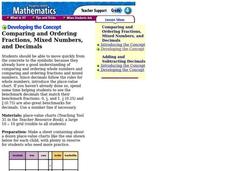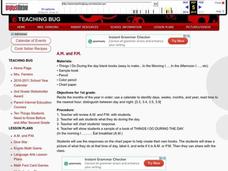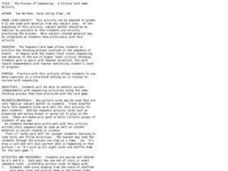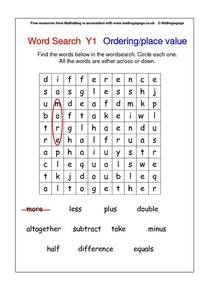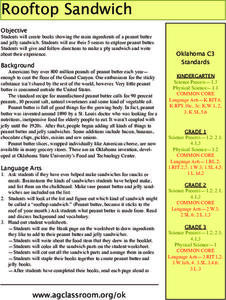Curated OER
Sorting
Young scholars examine Library organization. For this logic lesson, students watch a Between the Lions episode and consider how the library has been organized. Young scholars each list their 3 favorite book titles and how they would...
Curated OER
Ordering
Four sequences are missing some numbers; can your scholars fill them in? These aviation-themed number sequences require skip counting and counting backward. Beside each pattern learners can reference a jumbled set of numbers inside a...
Curated OER
Ordering Sets of Two
Place value is important as scholars begin ordering larger number based on their values. They order seven sets of numbers, ranging from three digits to seven digits. Then, they complete a word problem by examining four town populations...
Curated OER
Compare and Order Numbers
Students compare and order numbers to 100. They count numbers forwards and backwards. Given specific numbers, students place the numerals in the correct order. Students use bean bags, cubes, or blocks to compare and order numbers.
Curated OER
Reading, Writing, and Ordering Numbers
Students study place value. Students participate in place value and number relay games, write numbers in words, and discuss how numbers are read. As a class, they discuss the meaning of less than and grater than signs. Students use...
Curated OER
Use Models to Compare and Order Integers
Students investigate the concept of integers and how they should occur in the realm of irrational numbers. The lesson includes the use of positive and negative integers. The lesson is a good foundation in order to move into calculating...
Curated OER
Comparing and Ordering Fractions, Mixed Numbers, and Decimals
Learners practice comparing and ordering fractions, mixed numbers, and decimals. In this fractions, mixed numbers, and decimals instructional activity, students examine a decimal place value chart compared to a whole number place value...
Curated OER
Step Into My Shoes
Students order their classmates from smallest to largest foot length. In this ordering their classmates from smallest to largest foot length lesson, students trace each of their classmates foot. Students read a story called, 'How Big...
Curated OER
Fractions: comparing and ordering
In this fractions activity, students compare 2 fractions and order a set of fractions. Students complete 8 comparing and 4 ordering problems.
Curated OER
A.M. and P.M.
In this ordering and time lesson, 1st graders review the meaning of A.M. and P.M. and discuss what they do during the day. Students chart their responses and then make a book of their daily activities.
Curated OER
The Process of Sequencing- A Picture Card Game Activity
Students put the events of a story in the correct order. In this sequencing lesson, students are paired up and labeled A or B. Students in each group receive a set of story or event sequence cards and they take turns drawing from the...
Curated OER
Order Me
In this ordering worksheet, students examine pictures of five young people. Using the clues provided, students label the people 1st, 2nd, 3rd, 4th, and 5th.
Curated OER
Word Search Y1: Ordering/Place Value
In this ordering and place value worksheet, students look at, find and circle 11 key terms associated with ordering and place value in a word search puzzle.
Curated OER
Ordering Numbers (Worksheet e)
In this ordering worksheet, students are given a list of four numbers, all containing three digits. Students rewrite the numbers in order, according to the instructions. Some numbers are written greatest to least, and others are...
Curated OER
Worksheet: Ordering Decimals and Fractions
In this ordering decimals and fractions worksheet, students rewrite fractions in the same unit and then place them in sequential order. A "how to" example is given, with step by step instructions. Eight problems are provided. Students...
Curated OER
Comparing and Ordering Decimals
Fifth graders practice comparing and ordering decimals. Using a given website, 5th graders play a game, "Builder Ted" where they rescue Ted's dog from a leaky room by comparing and ordering numbers. Students select numbers, in sequential...
Curated OER
Ordering Numbers
Seventh graders compare and contrast positive and negative numbers. They create a T-Chart and list real word examples of positive an negative numbers. After observing an number line and a football field, 7th graders describe the...
Curated OER
Rooftop Sandwich
Students create books showing the main ingredients of a peanut butter and jelly sandwich. They get creative and see what other ingredients they may like to add to the original sandwich. A book is made and their sandwich is sent home....
Curated OER
The Gingerbread Man
In this unit students use the traditional tale of the gingerbread man as a context for ordering and comparing lengths. They compare the length of two objects directly, order three or more objects by length and select objects that are...
Curated OER
Ordering a Pizza
Students role play ordering a pizza focusing on requests and vocabulary including numbers, money and food. They brainstorm food items and create the menu. Using virtual money, they order and fill out a spending worksheet.
Curated OER
Order Me
In this categorizing people worksheet, students study the order of Anna, Tim, Lisa, Paul, and Karen. Students then read each sentence about the order of the people and answer the identification question.
Curated OER
Ordering Objects By Length
Students compare and describe objects of differing lengths that are presented in a Mathkeys software compare mat. Working in pairs, one student is the chooser who sets up the objects while the other student is the sizer who puts the...
Curated OER
Little, Medium, Big
Students order different-sized objects from little to big, click, drag, and hold objects using a computer mouse, and improve confidence with computer skills. They use the computer mouse to order sets of clip art in a Word document.
Curated OER
Prints and Outlines
Young scholars determine the area of two objects by superimposing one on the other. They compare and order the area of different shapes by covering a larger shape with similar smaller ones. They complete these activities as different...








